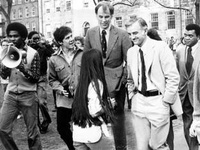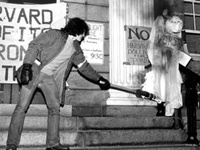One day after the Corporation handed down its decision, hundreds of students staged a “sit-out” and picketed outside University Hall, forcing the building’s closure for the day.
“We were furious at the time,” says Ruskin. “They dismissed us.”
Concerned about the actions his presence might incite, President Bok relocated to a new office about 250 yards away from the student protesters.
Bok said he moved from Mass. Hall because his attempt to enter his office earlier in the week had produced an incident he did not wish to be repeated.
“After the incident, I’ve been a little bit afraid that my being there may provoke a reaction that may endanger students,” Bok said. He added that his decision to temporarily relocate was not out of concern for his own welfare.
In an interview on WHRB and a speech at the Quincy House senior dinner, Bok defended the Corporation’s position on divestiture, saying that divestiture is not a particularly effective method of producing political change.
“Making a statement by withdrawing is the easy way out,” Bok said. “If you want to maximize your influence with companies, you have to hang in there and try to convince them.”
Looking back from today, Bok maintains that divestment would not have hastened apartheid’s demise and says he feels the University “absolutely” made the right decision.
Lasting Effects
Although student demonstrations were not successful in prodding Harvard to divest from South Africa, the University did alter several of its investments that spring.
Just days before releasing its decision, the Corporation decided to support a resolution by shareholders in Kodak calling for an end of Kodak sales of photographic equipment to the South African government.
The University also sold more than $600,000 worth of stock in two banks which were lending money to the South African government. But University officials claimed that the sale was purely financial and that one of its investment firms—not the University—had initiated the action.
In a statement to the press, the ACSC said the University’s failure to acknowledge the ethical factors of the transaction “in the face of mounting student and faculty pressure is further evidence of the University’s unwillingness to take a clear, public and forthright stand against apartheid.”
Also in the wake of the student protests, Radcliffe—whose investment portfolio was separate from Harvard’s—decided to reexamine its own relationship with firms in South Africa. As a result, the school sold $480,000 worth of stock in the Bank of America, which had loaned money to South Africa.
SASC’s demonstrations drew a great deal of attention to the issue of divestment—an issue of contention at colleges across the country at that time—and led to deeper evaluation of the matter.
Read more in News
Pataki: 'Yale is Going to Crush Harvard'














